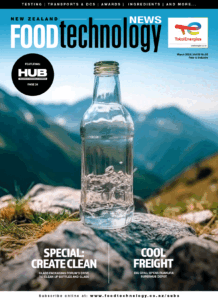
From initiatives to reduce water and energy consumption to products and materials that can be reused or regenerated, featured suppliers will be acknowledged with sustainability spotlight floor tiles directing to their stand. Details on sustainability spotlights will also be on digital signage located around the expo.
“Sustainability has become increasingly important in the food and beverage manufacturing sector,” says foodpro product manager, Felicity Parker. “This year is the first year we have shone a spotlight on sustainable companies. Not only do we have a great range of environmentally conscious exhibitors, we also have a range of top speakers who will be discussing aspects of the topic.”
The Smart Food Lounge, sponsored by Schneider Electric, will feature presentations such as: The Benefit of Commercialising Excess Food, Sustainable Packaging for the Food Industry from the Australian Institute of Packaging; Leveraging Bio Ingredients to Reduce Food Waste; APCO’s Australasian Recycling Label Programme and a discussion on The Sustainability of Meat from the Australian Meat Industry Council.
Foodpro’s operations manager, Luke Norris, adds that foodpro has also been working hard on improving their own sustainability regarding the event.
“We have introduced water refill stations, recyclable and compostable food packaging, and a separated bin system to support the removal of unnecessary packaging and resource recovery,” he says. “As our venue partner, the MCEC has also introduced energy and emission reduction initiatives to reduce the environmental impact of our event.”
Additionally, name badges at foodpro will be recyclable. The Hurricane (or Cyclone badge) is made from fully recyclable class 5 PP plastic (Polypropylene). At the show’s close, all badges will be collected and taken to a facility where they will be remade into another product.
To be held 23-26 July 2023, at the Melbourne Convention and Exhibition Centre, this year Australia’s leading and longest running food manufacturing industry event will feature more than 380 exhibitors.
Leading sustainability suppliers at foodpro 2023 include:
- ‘See’ is a leader in protecting and solving critical packaging challenges. The business designs and delivers packaging solutions which safeguards food, protects essential goods transported worldwide, enables e-commerce deliveries, and creates digital connectivity. Its portfolio of packaging solutions integrates sustainable, high-performance materials, automation and digital technologies. See says sustainability is in everything they do as essential packaging reduces greenhouse gas emissions by minimising food spoilage and product damage. The company has made a 2025 sustainability pledge to produce 100% recyclable or reusable materials plus 50% average recycled or renewable content by 2025. It has an aim to have net zero carbon (CO2) emissions by 2040 across global operations.
- Flow Power empowers businesses to unlock value from the wholesale energy market. From retailing electricity, building renewable projects, to providing the latest technology and expert engineering advice, Flow Power partners with food and beverage manufacturers to reshape how they manage energy.
- Omya is a global producer of calcium carbonate and a worldwide distributor of specialty materials. Founded in 1884, Omya offers innovative solutions based on high purity natural minerals and complementary ingredients in food, pharmaceuticals, nutraceuticals, personal care, home care and petfood. In 2008 Omya embarked on a partnership with The Natural Step, a non-governmental organisation (NGO) specialising in sustainable development. Omya is fully committed to realising a governance structure which incorporates the principles of sustainability. This takes into account compliance with applicable laws, rules and regulations and constant efforts to reduce environmental impacts with a focus on environmental responsibility. Facilities must operate safely and be considerate of the community in which they operate.






























































































